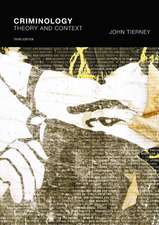The Development of Criminal and Antisocial Behavior: Theory, Research and Practical Applications
Editat de Julien Morizot, Lila Kazemianen Limba Engleză Hardback – 12 dec 2014
| Toate formatele și edițiile | Preț | Express |
|---|---|---|
| Paperback (1) | 661.14 lei 6-8 săpt. | |
| Springer International Publishing – 23 aug 2016 | 661.14 lei 6-8 săpt. | |
| Hardback (1) | 669.20 lei 6-8 săpt. | |
| Springer International Publishing – 12 dec 2014 | 669.20 lei 6-8 săpt. |
Preț: 669.20 lei
Preț vechi: 787.29 lei
-15% Nou
Puncte Express: 1004
Preț estimativ în valută:
128.05€ • 139.53$ • 107.90£
128.05€ • 139.53$ • 107.90£
Carte tipărită la comandă
Livrare economică 23 aprilie-07 mai
Preluare comenzi: 021 569.72.76
Specificații
ISBN-13: 9783319087191
ISBN-10: 3319087193
Pagini: 350
Ilustrații: XIV, 564 p. 13 illus., 3 illus. in color.
Dimensiuni: 178 x 254 x 30 mm
Greutate: 1.22 kg
Ediția:2015
Editura: Springer International Publishing
Colecția Springer
Locul publicării:Cham, Switzerland
ISBN-10: 3319087193
Pagini: 350
Ilustrații: XIV, 564 p. 13 illus., 3 illus. in color.
Dimensiuni: 178 x 254 x 30 mm
Greutate: 1.22 kg
Ediția:2015
Editura: Springer International Publishing
Colecția Springer
Locul publicării:Cham, Switzerland
Public țintă
ResearchCuprins
I. Theoretical Foundations of Developmental Criminology.- Understanding Crime and Antisocial Behavior within a Multidisciplinary and Developmental Perspective.- Fundamental Concepts in Developmental Criminology.- Differences in Degree or Kind?- II. Risk Factors and Developmental Processes.- Genetic Factors.- Prenatal, Perinatal, and Neonatal Risk Factors.- Family Risk Factors and Processes.- Peer Group Risk Factors and Processes.- School Risk Factors and Processes.- Community-Level Risk Factors and Processes.- Personality Risk Factors and Processes.- Resilience and Developmental Trends.- Criminal Careers and Desistance.- III. Special Themes in Developmental Criminology.- Women and Crime.- Delinquency and Substance Use.- Street Gangs.- Sex Offending.- VI. Applied Policy Implications of Developmental Criminology.- Early Prevention Programs in Infancy and Childhood.- Clinical Interventions with Adolescent Offenders.- The Link Between Situational and Developmental Prevention.- V. Conclusion.- The Future of Developmental Criminology.
Notă biografică
Lila Kazemian is a graduate of Université de Montréal in Canada, and she earned the Ph.D. in criminology at the Institute of Criminology, University of Cambridge in England. She joined the sociology faculty of John Jay College in 2006 after completing a post-doctoral fellowship funded by the Economic and Social Research Council (ESRC, UK). Her research interests include life-course and criminal career research, desistance from crime, offender reentry and comparative criminology.
Textul de pe ultima copertă
This edited book summarizes the current state of knowledge on the development of criminal and antisocial behavior over the life course. It focuses mainly on the developmental perspective, which has had a paradigmatic influence on current theoretical and empirical works in criminology. Drawing on a multidisciplinary perspective, the book explores:
(a) the fundamental concepts of developmental criminology;
(b) the risk and protective factors, as well as developmental processes, related to the most salient personal (e.g., genetics, personality) and environmental (e.g., family, peers, school, neighborhood) domains explaining the onset, development and desistance from criminal and antisocial behavior over the life course;
(c) the developmental issues related to a number a special themes (e.g., female criminality, street gangs, sex offending, substance use) and;
(d) the applied and policy implications of research in developmental criminology.
In each chapter, prominent researchers from different disciplines such as criminology and psychology summarize the state of knowledge on a specific topic and offer recommendations for future research needs.
This volume is a valuable resource for researchers studying criminology and criminal justice, as well as related fields such as psychology, psychiatry, sociology and public policy.
(a) the fundamental concepts of developmental criminology;
(b) the risk and protective factors, as well as developmental processes, related to the most salient personal (e.g., genetics, personality) and environmental (e.g., family, peers, school, neighborhood) domains explaining the onset, development and desistance from criminal and antisocial behavior over the life course;
(c) the developmental issues related to a number a special themes (e.g., female criminality, street gangs, sex offending, substance use) and;
(d) the applied and policy implications of research in developmental criminology.
In each chapter, prominent researchers from different disciplines such as criminology and psychology summarize the state of knowledge on a specific topic and offer recommendations for future research needs.
This volume is a valuable resource for researchers studying criminology and criminal justice, as well as related fields such as psychology, psychiatry, sociology and public policy.
Caracteristici
Describes the fundamental concepts of Developmental Criminology Assesses the impact of Developmental Criminology research on crime prevention and treatment programs Summarizes key findings from systematic reviews Provides directions for future research











